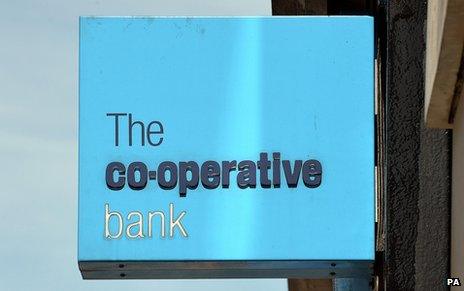Co-op pays for past sins
- Published
- comments

The scale of the loss incurred by Co-op Bank is reminiscent of the catastrophic problems suffered by its competitors in the bleak days of the 2008 banking crisis.
And to an extent they can be traced back to that crisis, because much of the loss stems from Co-op's takeover of the weakened Britannia Building Society in 2009 - a deal that was at the time encouraged by the regulator, the Financial Services Authority, on the mistaken assumption that the larger bank being created would be a stronger bank.
In the first six months of this year, losses of Co-op Bank were £709m before tax and £781m after tax.
As the bank's auditors KPMG confirm for the first time in notes to the accounts, Co-op Bank would not be a going concern - it would be bust - in the absence of the rescue currently being prepared and negotiated.
This rescue involves the bank's owner Co-op Group putting £1bn into the bank and its bondholders - a group of creditors owed £1.3bn - contributing a further £500m.
That contribution of £500m by the bondholders can be seen as a loss being forced on them. Which is why many of them are cutting up rough about the deal.
Their unhappiness is one explanation for why KPMG says there are "material uncertainties" about whether the rescue, known as the Exchange Offer, will go through later this year.
But in the absence of the rescue, and with the bank in those circumstances no longer a going concern, the directors of Co-op Group fear they would have no option but to put the bank into a process called "resolution", administered by the Bank of England.
In resolution, the priority would be to keep the bank functioning and protect the interests of savers, but losses for bondholders could be even bigger.
The regulator, the Prudential Regulation Authority, this morning said that the announcement by Co-op Bank of its huge losses was consistent with its view that the bank has to find £1.5bn of new capital.
It added it would "hold the Co-operative Bank to its plans [to raise £1.5bn] and if they fall short of what is required it will ask for additional action".
Most of the problems at the bank stem from the period when the bank and group were under different management.
The two biggest contributors to the losses were a £148m write-off of investment in new IT systems - thought necessary when Co-op had plans to become a much bigger bank - and almost £500m of losses on loans that have gone bad.
As I have mentioned before, there are important questions that need to be answered by regulators and by the past management of Co-op Group and Co-op Bank about why they failed to identify the scale of bad loans when Britannia Group was bought and subsequently.
Of the £496m of losses on bad loans incurred in the first half of the year, only £126m represents losses on new defaults or a deterioration in the ability of customers to repay.
A loss of £124m came from what Co-op's management describes as a "better understanding" of the portfolio of bad loans and £246m came from a different approach to managing the bad loans.
Which implies that some £370m of losses could have been recognised some time ago, if past management had adopted the techniques of current management.
As for what the future holds for Co-op Bank, in an attempt to become more sustainable it will shrink considerably. The current network of 330 branches is likely to be significantly reduced.
Long long gone is the idea that Co-op would be a serious challenger to the biggest banks. And its previous plan to treble in size, by buying more than 600 banks from Lloyds - a takeover encouraged by the chancellor - would now be seen by many as extraordinarily naive (at best).